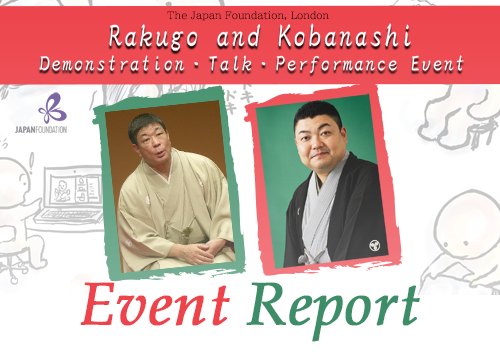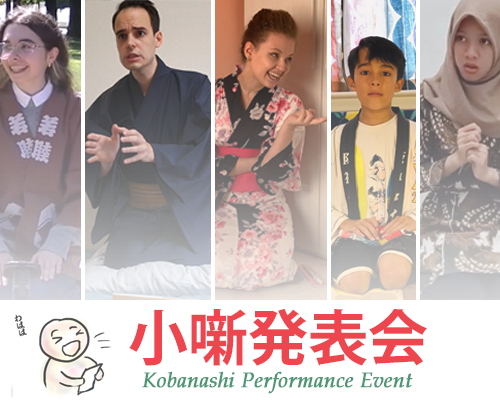12/10/2021

You’re in a small, Japanese-style theatre room. The house lights are up, and you’re surrounded by a chattering, excited crowd. People are sipping ice tea from plastic bottles, fanning themselves, and looking towards the empty stage. Suddenly, a loud buzzer sounds and the crowd falls silent. The room remains shining brightly, but a lone man walks onto the stage and settles down into a seiza position on a cushion – legs neatly tucked under and back ramrod straight. The only items beside the man are a Japanese folding fan and tenugui (a cotton Japanese hand towel).
As the sitting man begins to speak, he transforms into a hard-working Edo-era man walking about. He shuffles on his knees, patting his head and muttering to himself. And then – within an instant – our average Edo man is transformed: he hunches over, his flustered face morphs into a sinister smile, and he emits a terrifying laugh. He has become a Shinigami (god of death!). The figure of the performer on stage has remained seated all the while. There is no costume change, no extravagant sets. One man, sitting alone on a stage, transforms himself and tells a story using gesture, voice and a simple fan and hand towel.
This is rakugo – the traditional art of one-man storytelling in Japan. These stories can be comedic or sometimes dramatic, but the fundamentals are always the same: one person kneeling on stage, performing alone.
Most people outside of Japan do not get the chance to experience a rakugo theatre and so we were honoured to be able to transport viewers from around the world to the world of rakugo through our two day Rakugo and Kobanashi Demonstration, Talk and Performance Event on the 25th and 26th September 2021.
The two day event was MC-ed by Mr Marco Di Francesco, a DPhil Candidate, Area Studies (Japan) at the University of Oxford, and a passionate advocate for rakugo. Mr Di Francesco is currently researching contemporary rakugo in Tokyo. Over two days, Mr Di Francesco led the audience through a series of fascinating talks and funny, frightening rakugo and kobanashi performances.
Day One – 25th September 2021 (Saturday)
The event kicked off with an explanation of the art of rakugo given by Professor Kazumi Hatasa, a Professor at the School of Languages and Culture at Purdue University in the United States of America. He has many years of experience working with professional performers to incorporate rakugo and kobanashi into Japanese language education, and his talk served as a comprehensive introduction to the unique world of rakugo performance.
Professor Matilde Mastrangelo, a Full Professor of Japanese Language and Literature at Sapienza University of Rome then gave an insightful lecture on the topic: “Can Rakugo be Funny for Any Audience?” in which themes of cross-cultural communication and humour were elaborated on. This was particularly relevant to the weekend’s event, whose audience were located all over the world.
During both talks, our experts took questions from the lively and curious audience.
The day ended dramatically with a terrifying rakugo performance of the ghost story “God of Death”, performed by Master Yanagiya Sankyō, which was preceded by an introduction from Professor Hatasa. The story involves a burdened Edo man making a deal with a sinister god of death in return for money, and the audience watched in rapt silence as the scary tale reached its climax. We were honoured to see this performance by Master Sankyō, a Rakugo Master from Tokyo who has performed rakugo since 1967 and received the highest rakugo rank (Shin’Uchi Rakugo Storyteller Master). He was given the Medal of Honour with Purple Ribbon by Japan in 2017.
Day Two – 26th September 2021 (Sunday)
Day Two began with an animated and detailed Dialogue in Japanese between Professor Kazumi Hatasa and Mr Marco Di Francesco. The theme of the discussion was “The Utilisation of Kobanashi in Japanese Language Education and its Practice”. It was great to hear two expert and deep fans of rakugo discuss the important role rakugo can play in teaching Japanese language.
Next, we enjoyed a Kobanashi Performance Event performed by students of Japanese from around the world, with the cooperation of the Organising Team of the International Kobanashi Festival (KKGH). Kobanashi are very short, witty stories that are often performed before the main rakugo performance. The chat-function of our Zoom event, which was open to the audience, became crowded with laughter emoticons and people delighting in the comedic stories given in Japanese by students of Japanese (with English subtitles).
After these wildly entertaining kobanashi performances, our audience was ready for even more laughter. Professor Hatasa introduced the final rakugo performance of this event: “Kanjou Box”, a very funny rakugo performance given by Master Ryūtei Saryū. What a contrast from the horrors of “The God of Death” on Day One, as the audience giggled at this extremely silly story of two men going to stay in an inn and getting tangled in a misunderstanding with the proprietor. We were honoured to see this performance by Master Saryū, a Rakugo Master from Chiba Prefecture and an apprentice of Master Sankyō. Master Saryū achieved Shin’Uchi Rakugo Master Storyteller status in 2006, and lectures part-time at Tokyo Woman’s Christian University.
Following this performance, our audience was given the rare opportunity to pose questions to two masters of Rakugo (Master Sankyō and Master Saryū), with interpretation provided by Mr Marco Di Francesco. This was a great chance to find out more about what it is like to be a Rakugo performer, and was a window into the deep and long-held traditions of the world of Rakugo in Japan.
---
We are delighted at the interest people showed in this event, and the positive feedback we received from our audience. We really hope that this event has encouraged people from all over the world to seek out Rakugo and Kobanashi, and maybe to have a try at performing themselves!
We would like to thank all of the performers and speakers for kindly sharing their expertise and time with us. It is thanks to their hard work and generosity that this event was such a success.
We would also like to thank the Organising Team of the International Kobanashi Festival (KKGH), who helped us to organise this event, and who delighted us by sharing the kobanashi performances of students from across the globe.
If you are interested in attending more events like this one in the future, please keep an eye on our What’s On page for information on all upcoming events!
You can download the full programme for this event below:





 Japanese Language Navigation
Japanese Language Navigation

